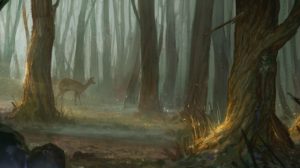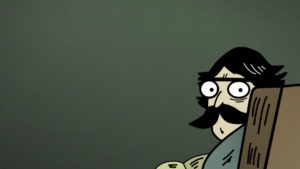Growing Pains
I have been reflecting, of late, on my blogging experience throughout this class. When looking back at my blog post arch over this semester I could not help but cringe just a little. Looking back at all of them, I was not proud, especially of my first two posts. I wrote them not knowing how to write on a blog nor what to write about, but before I delve into my growth over this semester, I need to go further back in time.
Interpretations
(This image was created by the artist Cameron Gray)
Warning. This post contains spoilers regarding Frenzy by Percival Everett.
On Love and Chemicals
*Warning* this post makes mention of sexual acts and actions.
[The image is credited to the artist Cameron Grey]Contemporary
In class, we did an exercise that was prompted by our class reading of Percival Everett’s poem “Zulus” from his book of poems entitled re: f (gesture). “Zulus” is an abecedarian poem. In class Dr McCoy had us split into small groups and individually write the first few stanzas of an abecedarian poem. Our only requirement was to make allusions to things are relative to our lives, and/or contemporary issues, etc. After we were done writing the stanzas we shared them with the other members of our small group. The exercise turned out to be more confusing than we had originally thought, and we had all interpreted the instructions that Dr McCoy gave a little differently than we each other, it was certainly a lesson about miscommunication!
I thoroughly enjoyed the exercise, so I continued the poem I had started. Here is my first stab at an abecedarian poem, it is called “Contemporary”:
Walking Thoughts on Deer
The other morning, I was out on a walk in the village of Geneseo not too far from Highland Park. I was appreciating the general beauty of the leaf-scattered sidewalks and street, admiring the architecture of the buildings around me. There was a fog resting just overhead, lending to the ambience of the scene before me. As I walked, I happened to glance down a street to my left and noticed a figure silhouetted against the grey weather and motley streets. It took a moment for me to realize that the figure staring back at me was a deer. The deer was tense and startled by my presence and yet, I could not help but observe that the deer also appeared to me as forlorn, in the way that it turned to me. It stared at me a moment then turned slowly and walked off into a backyard. The deer left me feeling strangely melancholy and saddened. I pondered for a while, why did this animal going about its business, strike me in such a manner?
Questions and Mantras
In a previous post, I wrote about the issues of apathy in the culture of the U.S. Although I have tried to move past apathy, I have not been able to. I think that apathy is a highly important issue in contemporary times. It is also, thankfully as something I am a little obsessed with it, highly relevant to readings and discussions in the class I am writing this blog post alongside.
As I discussed in the post that I mentioned above, the character of the god Dionysus, both in Frenzy by Percival Everett and Euripides ancient play The Bacchae, is highly apathetic. Apathy in a god is fitting and expected yet, high levels of apathy in humans can be quite dangerous. The theme of apathy and distance from one’s self and by extension one’s surroundings are a prevenient theme in Everett’s work. The character of Dionysus is highly apathetic in Frenzy, but also in Everett’s work I am Not Sidney Poitier, the character of Ted Turner could be seen as very apathetic. Ted Turner is the appointed guardian of Not Sidney, the protagonist. Despite this, Turner is constantly putting distance between himself and Not Sidney acting aloof and distant in many of Not Sidney’s times of need. For example, at one point in the novel, Not Sidney is very upset because he is staying with a racist family and calls Turner for comfort and advice. Not Sidney explains the dynamic and details of his situation making it glaringly apparent that he upset. Turner gives very unhelpful advice and no comfort whatsoever and quickly ends the phone call because he is “off to Montana tomorrow” [Everett 147]. This is but one example of Turner’s apathetic distance from Not Sidney.
Although there are many instances of apathy throughout both of the novels, it is a sickening issue far beyond the content of books. The issue of apathy is highly relevant to now. Although, I have begun to realize that apathy is only a single ingredient in a sad meal that is being fed to U.S. culture. The recipe consists of apathy combined with boredom which then almost certainly leads to pacification. This meal is very dangerous because when in a state of pacification, it is very easy for an entity to be influenced. To what end U.S. culture is being influenced, I do not know.
“What’s wrong with your eye?”
Written and revised by:
Marc Choi, Brianna Linn, Lael Truth, Brian Vargas, and Christina Yi
“What’s wrong with your eye?… Looks like the boy’s gonna pop” (Everett 19)
We imagine this image, a portion of the “Staredad” meme, to be an accurate representation of the famous fesmerizing stare used constantly by the protagonist Not Sidney Poitier in Percival Everett’s novel I Am Not Sidney Poitier. The image above depicts a man with an apparently crazy and dazed stare, who possesses an extremely powerful gaze. While it may introduce a feeling of uncomfortability, it also gives rise to the question: “Can a look so stern give someone the power to control others?”.
Thinking on Apathy
I have been contemplating apathy quite a lot recently. A theme that is relevant in my reading of Percival Everett’s novel _Frenzy_. The character of Dionysus has an abundance of apathy. He feels little and cares even less. Throughout my reading of _Frenzy_ I felt familiar with the apathetic mindset of Dionysus. Yet, for the life of me, I could not figure out why Dionysus’s apathy felt familiar.
Thoughts on Driveways and “The Bacchae”
On my walk to school the other day, I saw a driveway that had been stripped to the ground, right down to the dirt. Clearly there had been something akin to asphalt there before, something to smooth the path for vehicles and said vehicles owners.
For those familiar with Geneseo, I was walking down Oak Street. For those unfamiliar, Oak Street is a short stretch of village road with beautiful oak trees stretching out across the thoroughfare. It is a residential street with plenty of well-kept old homes and I might add–although it is completely irrelevant–an abundance of cats. The property I was observing that day was one of those older, well looked after type places. I walked past this stripped driveway, lost in thought. My thoughts running along the lines of “I really need to write another blog post, but I feel like I’m drowning in my work load.” This is when I began to try and relate “The Bacchae” (per my assignment) to just about anything. Suddenly I stumbled across something:









